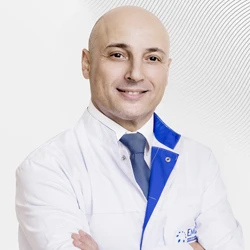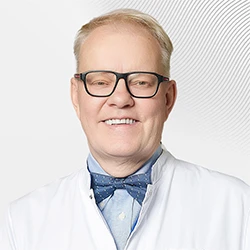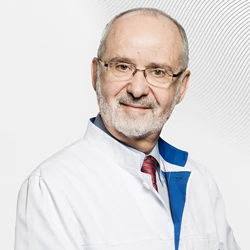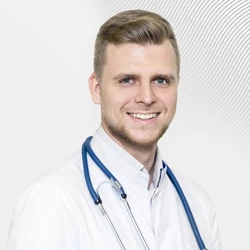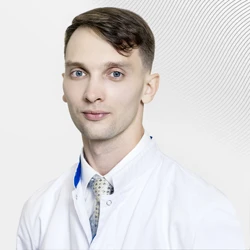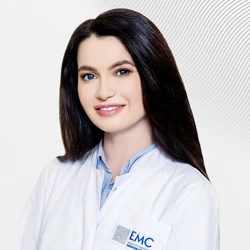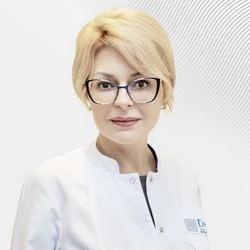Laryngeal Cancer Treatment
Stages of the disease
The international classification TNM is used to determine the stage of laryngeal cancer (it is applicable to all types of oncology). T is the size of the malignant neoplasm, N is the signs of lymph node damage or absence, M is metastases in other organs. Analyzing all the indicators, the doctor determines the stage of oncology for throat cancer (there are four of them in total). If cancer is noticed in the early stages, the prognosis will be the most favorable, since cancer develops in the area of the vocal folds: here it can be removed by endoscopic surgery. In this case, with proper treatment, the probability that the patient will live for at least 5 years is 99%, at the third stage – 65-70%.
Histologically, cancer of the throat is almost always squamous cell carcinoma: it develops from cells of the mucous membrane of the larynx. Less often – adenocarcinoma, which is formed from glandular tissue. Malignant neoplasm of the larynx rarely metastasizes to other organs: it is usually limited to the lymph nodes of the neck.
Almost 100% of laryngeal cancer patients are patients who smoke. Non-smokers are extremely rare. Of the precancerous diseases of throat cancer, there are also chronic hypertrophic laryngitis, leukoplakia or papillomatosis of the throat. In the latter case, papillomas that form in the laryngeal lumen eventually degenerate from benign to malignant neoplasms. Human papillomavirus (HPV) is also an important factor in the development of laryngeal cancer. Specialists always carry out HPV testing, so when the virus is detected, the prognosis will be more favorable.
Laryngeal cancer is treated with surgery, chemotherapy, radiation, immune therapy, and a combination of these methods. The type of treatment for laryngeal cancer depends on the specific part of the tumor and its size. Before choosing a method, doctors also weigh the likelihood that a person will live five years after treatment for laryngeal cancer. If the probability is low, then it is most important to maximize the patient's life without losing its quality. It is also important to take into account that if the tumor has formed in the middle part of the larynx and is limited to ligaments, then surgical and radiation treatment can completely cure the patient. How many courses of radiation therapy and chemotherapy need to be completed is determined individually for each person.
The method of treatment of recurrent cancer depends on the method used to combat the primary malignant neoplasm. So, if the surgical method was initially used, and a year later the tumor was formed again, then the chemoradiotherapy method will be used in the treatment. Targeted therapy is also possible during the treatment of laryngeal cancer.
Advantages of treatment in EMC

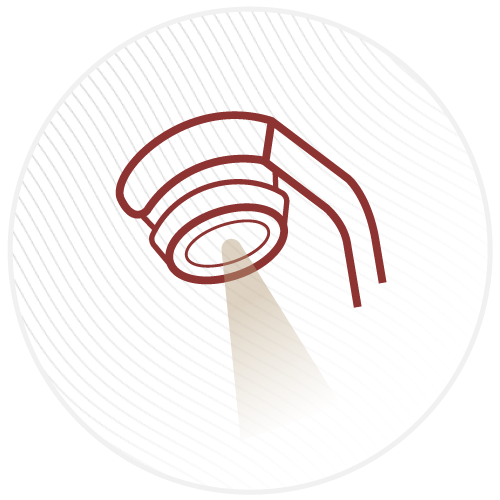


Throat cancer surgery
Surgery is a highly effective method of treating laryngeal cancer, but it is not always possible. The larynx can be operated on with certain fragments (if the tumor is small) or removed entirely (if it is large). In the second case, it is a dangerous operation, during which a person becomes disabled and loses vital functions. In our center, preference is given to organ-preserving methods of treatment. As a rule, in case of throat cancer, operations are performed in the early stages. Very often it is a tumor on the fold, which can be easily removed with the help of micro-tools and lasers. If the tumor is large, then, if necessary, it can be removed along with the larynx. This is a traumatic operation that leads to disability even after defeating throat cancer. After that, the patient will need to be fitted with endoprostheses in order to regain the necessary functions to ensure vital activity. In order to talk again, the patient will need classes with a specialist.
At the European Medical Center, surgical treatment of laryngeal cancer is performed with the participation of a leading specialist in otorhinolaryngology specializing in Head and Neck Surgery, an otorhinolaryngologist-surgeon, Professor Millier Jean-Rene (France) and an otorhinolaryngologist-surgeon, Doctor of medical sciences, Professor Gennady Elkun.
The innovative method of transoral surgery (TORS) is also used in the treatment of throat cancer. This means that during the operation, the surgeon receives a 3D image of the operated area with 10x magnification. An EMC clinic in Moscow, where a robot-assisted operation is possible on a Da Vinci SI HD device (it is operated by a doctor during surgical treatment). With the help of the robot's micro-tools, small punctures can be made and a tumor can be removed in case of throat cancer. The absence of large incisions on the skin and low blood loss after surgery significantly reduce the duration of rehabilitation.
Advantages of surgical treatment at the EMC clinic
- Leading experts Millier Jean-Rene and Gennady Elkun;
- The possibility of using an innovative method of transoral surgery (TORS);
- The possibility of robot-assisted surgery on the Da Vinci SI HD
Radiation therapy
Throat cancer treatment most often begins with radiation therapy. If the tumor in the larynx is large, then chemo- and radiation therapy methods are combined in the treatment of laryngeal cancer. This allows you to preserve important functions for human life and, with them, the quality of life. During radiation therapy for throat cancer, special equipment irradiates cancer cells, which leads to their death. Very often, classical radiation therapy exposes not only cancer cells, but also healthy ones. The RapidArc/IGRT (Image Guided Radiotherapy) technique makes it possible to purposefully destroy a tumor without affecting healthy tissues.
In order to treat laryngeal cancer effectively, the EMC has many special technologies for standardizing the patient's position: high-precision linear accelerators and radiotherapy tables with six degrees of freedom. There is also the possibility of X-ray examination of the patient's position on the treatment table and its correction in real time, as well as a highly qualified team of radiotherapists, medical physicists and nursing staff.
In the European medical center, radiation treatment for throat cancer is performed using the RapidArc/IGRT method on the most modern Varian EDGE linear accelerator using a unique technology. This linear accelerator allows you to deliver the dose as accurately as possible to achieve the best results, using technologies not available on other linear accelerators.
Chemotherapy
Course-based preoperative chemotherapy for throat cancer solves the following tasks: to reduce the size of the malignant neoplasm before surgery or radiation therapy, to control tumor growth in order to reduce pain due to its pressure on other organs, to destroy microscopic cancer cells that could remain after other types of treatment or kill new ones. This method of treatment involves several cycles, the number of which depends on the stage at which the disease is diagnosed. Chemotherapy is most often used in the fourth stage of laryngeal cancer as a palliative treatment. We use a wide range of cytostatic, targeted drugs and immunotherapy. It is also used in the third stage: sometimes treatment does not begin with the removal of the larynx, but with preoperative chemotherapy. The patient is prescribed several courses of chemotherapy. If the tumor shrinks during it, radiation therapy and additional courses of chemotherapy are added to the treatment. The treatment is carried out under the supervision of doctors of various specialties (oncologists, radiotherapists, radiation diagnostics specialists, molecular biologists.
Certified drugs from the USA and Europe are used for treatment at the European Medical Center for Throat Cancer. Chemotherapy sessions are conducted in accordance with international treatment protocols. The doctor monitors the reaction of each patient's body to a particular drug and, if necessary, selects an alternative drug. Dual control of appointments and their execution ensures complete elimination of errors, and an impeccable level of service allows patients to receive this difficult type of treatment without harming the body.
Targeted therapy
Targeted means "purposeful". With this type of therapy, molecular genetic tests are performed to make a molecular portrait of the tumor in throat cancer and select the drug that will kill cancer cells without harm to healthy ones. The drug is taken by the patient in tablets, which means that the course of treatment can be completed at home.
The European Medical Center is the only clinic in Moscow (and Russia as a whole) where it is possible to perform the most comprehensive genome–wide profiling for the selection of drug therapy. To prescribe the treatment, the wishes and comments of all members of the special council, the molecular tumor board, are taken into account. Oncology is often referred to as the "disease of the genome." In the EMC laboratories, specialists conduct a comprehensive molecular genetic analysis of cancer cells. This helps to identify the pathological genes and their combinations that triggered the development of cancer. The use of artificial intelligence allows us to predict which drug will have the greatest effect in the fight against laryngeal cancer.
Symptoms of throat cancer at different stages
Persistent hoarseness of the voice, which lasts more than two weeks, often indicates laryngeal cancer. In this case, it forms in the area of the vocal cords of the throat. The patient should immediately consult an ENT specialist. In addition, throat cancer causes the following alarming symptoms: persistent sharp pain in the throat, swollen neck, a feeling of a foreign object in the larynx, difficulty swallowing. Most of the symptoms become apparent in the progressive stages, whereas in the initial stages, only an experienced doctor can notice a malignant neoplasm of the throat. Laryngeal cancer occurs most often in patients after the age of 40, according to statistics, men develop this type of cancer more often than women.
Diagnosis of throat cancer
In order to diagnose laryngeal cancer, it is necessary to take the material for a biopsy. This is usually combined with the throat examination procedure (laryngoscopy). If the diagnosis of laryngeal cancer has been confirmed, additional research is needed.: These are magnetic resonance imaging (MRI) and positron emission computed tomography (PET-CT) . They will help to accurately determine the stage of development of throat cancer, assess the degree of damage to other organs and, based on the data obtained, make a competent treatment. Before each patient visits the clinic to plan radiation therapy, specialists study the results of their diagnostic tests (PET/CT, MRI). They can be used to determine the exact contours of a tumor in throat cancer and identify areas for radiation. Due to this marking, during the session, gamma rays will fall exclusively according to the specified parameters. This will allow only the cancer cells to be irradiated with the right amount of radiation, without harming healthy tissues. The number of courses of radiation therapy is determined individually for each patient, depending on the stage of laryngeal cancer.
Videolaryngoscopy with biopsy
During the procedure, the doctor examines the throat using a special device – a laryngoscope (a special tube with a small camera). During the examination, he additionally takes a sample of the tumor for histological examination. The procedure is performed under sedation to eliminate painful sensations.
MRI
Magnetic resonance therapy for laryngeal cancer accurately determines the location of the tumor formation. As a result of the study, the doctor receives images with the highest contrast of soft tissues.
PET-CT
Positron emission computed tomography is two types of diagnostics at once during one study. Using this method, it is possible to determine the contours of a tumor in throat cancer and assess the extent of its spread to other organs.
It is possible to calculate the price of laryngeal cancer treatment at a European Medical Center when an accurate diagnosis has been made, the stage of oncology has been determined and a treatment strategy has been chosen. You can find out the cost and payment procedure on our website.
Why the EMC
The first and only clinic in Russia, created in the image of the world's leading clinics
EMC is a multidisciplinary center offering patients a high level of medical services and a personalized approach
Worldwide recognition and awards
 Learn more
Learn more
Worldwide recognition and awards
 Certificates and licenses
Certificates and licenses
Make an appointment for a consultation
Specify your contacts and we will contact you to clarify the details
Reviews
and new products of the EMC
.webp)
